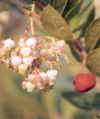
 T
T


 TREE OF THE STRAWBERRIES
TREE OF THE STRAWBERRIES


|
 T
T
|

|

|
 TREE OF THE STRAWBERRIES
TREE OF THE STRAWBERRIES
|

|
| madroño arbutus unedo |





 TREE OF THE STRAWBERRIES
TREE OF THE STRAWBERRIES


U.E.P.
 Add to Favorite
Add to Favorite
 Home Page
Home Page
 Recommend this Plant
Recommend this Plant
|

|
|
2008 © HIPERnatural.COM
www.hipernatural.com Your Source of Natural Health in Internet |
|